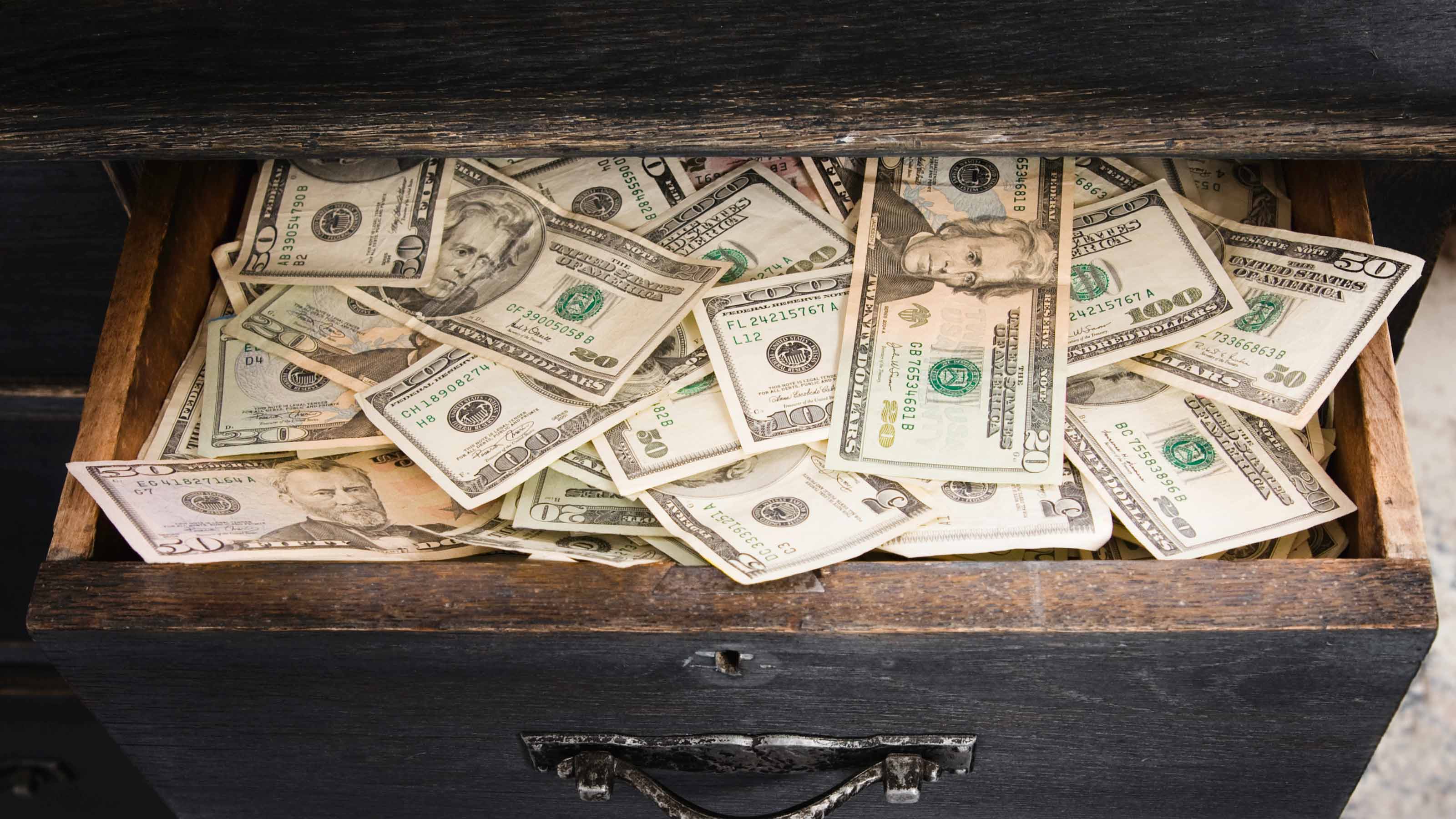It May Be Unsexy, But This One Asset Class Is Critical to Any Financial Plan
You can’t afford to forget about cash when planning for your wealth. Here are some guidelines to help manage this often-overlooked asset class.


Profit and prosper with the best of Kiplinger's advice on investing, taxes, retirement, personal finance and much more. Delivered daily. Enter your email in the box and click Sign Me Up.
You are now subscribed
Your newsletter sign-up was successful
Want to add more newsletters?

Delivered daily
Kiplinger Today
Profit and prosper with the best of Kiplinger's advice on investing, taxes, retirement, personal finance and much more delivered daily. Smart money moves start here.

Sent five days a week
Kiplinger A Step Ahead
Get practical help to make better financial decisions in your everyday life, from spending to savings on top deals.

Delivered daily
Kiplinger Closing Bell
Get today's biggest financial and investing headlines delivered to your inbox every day the U.S. stock market is open.

Sent twice a week
Kiplinger Adviser Intel
Financial pros across the country share best practices and fresh tactics to preserve and grow your wealth.

Delivered weekly
Kiplinger Tax Tips
Trim your federal and state tax bills with practical tax-planning and tax-cutting strategies.

Sent twice a week
Kiplinger Retirement Tips
Your twice-a-week guide to planning and enjoying a financially secure and richly rewarding retirement

Sent bimonthly.
Kiplinger Adviser Angle
Insights for advisers, wealth managers and other financial professionals.

Sent twice a week
Kiplinger Investing Weekly
Your twice-a-week roundup of promising stocks, funds, companies and industries you should consider, ones you should avoid, and why.

Sent weekly for six weeks
Kiplinger Invest for Retirement
Your step-by-step six-part series on how to invest for retirement, from devising a successful strategy to exactly which investments to choose.
If the past year and a half has taught us anything, it’s that having a good financial foundation is critical. While cash is such an important aspect of our everyday lives, many have become complacent about it, often overlooking it entirely as an asset class. Even if your priority is to grow your wealth, you need to build on a foundation of financial security. Cash is that foundation, offering you the comfort of knowing you can cover your monthly bills and unforeseen expenses.
With current interest rates so low, you may not even be thinking about your cash, but having a proper plan for it is a vital part of your financial health, and one that can add to your wealth in the long term.
As a financial planner who has helped hundreds of investors with their finances, I’ve seen a lot of money mistakes. One of the most common mistakes is clients trying to put too much of their wealth into non-liquid investments. While it’s tempting to aim for the biggest returns, this can lead to complications if unexpected events occur, like a job loss, larger-than-anticipated tax bill or even a global pandemic. Without easy access to cash, you may be forced to charge large amounts to your credit card or pull money from other accounts, incurring possible penalties or tax liabilities. You can avoid this simply by having a plan for your cash.
From just $107.88 $24.99 for Kiplinger Personal Finance
Become a smarter, better informed investor. Subscribe from just $107.88 $24.99, plus get up to 4 Special Issues

Sign up for Kiplinger’s Free Newsletters
Profit and prosper with the best of expert advice on investing, taxes, retirement, personal finance and more - straight to your e-mail.
Profit and prosper with the best of expert advice - straight to your e-mail.
The Basics: How to Make a Plan for Your Cash
I suggest structuring your cash in three tiers.
- The first tier: This layer is for your routine, recurring expenses. These are the predictable bills that come in every month. The amount you hold here is up to you: Some people keep the bare minimum and others prefer more of a cushion. Figure out the lowest number you’re comfortable with and make sure that amount is in your checking account every month.
- The second tier. This one is for larger planned expenses over the next 12-24 months, such as a car purchase, home repairs or a vacation. These are expenses you know are coming and can prepare properly for. Don’t be tempted to invest this cash while planning for these expenses, since it’s best to not take risks with money you know you’ll need. The goal should be to be able to pay for large expenses in full when the time comes. The amount of cash you set aside here may vary year to year, but these expenses are as important to consider as your immediate monthly expenses.
- The third tier. The last tier is your emergency fund, which should be enough to cover your expenses in the event you lose your job or experience another sudden expense. If you are younger, you may aim for three months of savings. If you are older or have a family, six months is ideal. This is money that is designed not to be spent, except in the event of a true emergency. Having this cash available can save you from financial catastrophe should the worst occur.
Where to Stash Your Cash
While tier one cash should be kept in a checking account, tiers two and three should be in savings accounts. Regardless of where you bank, you should consider leveraging online banks to earn the most on your cash. Online banks operate similarly to brick-and-mortar banks, just without the physical location. They’re FDIC-insured, and they have lower operating expenses, which means they pass along higher yields to you.
This will help prevent another common mistake I see, which is the acceptance of low interest rates. Because interest rates change so rapidly, it can be a full-time job to stay on top of the latest rates. A lot of my clients use MaxMyInterest, a cash management platform that automatically directs your funds from one online bank to the next based on which is paying the highest interest rate. This helps you earn the most possible on your cash while also keeping it liquid and accessible. While the money you earn may not be life-changing, over time it adds up – and I think we can all agree that earning more is better than earning less!
The Bottom Line
Cash may be less flashy than higher yield investments, but don’t underestimate its importance in building your wealth. If managed properly, your cash foundation should provide you with the safety and security to live comfortably. But if overlooked, it can be catastrophic to your financial well-being. Once your foundation is in place, you can then focus on building your wealth.
Whatever your income or stage in life, make sure your cash is working for you.
Profit and prosper with the best of Kiplinger's advice on investing, taxes, retirement, personal finance and much more. Delivered daily. Enter your email in the box and click Sign Me Up.

Derek Ripp, CFP® is a partner at Austin Wealth Management, a leading financial advisory team that works with families, executives and small-business owners to help them prepare a plan for the next phase of their financial lives. He helps families achieve financial independence and peace of mind. Derek lives in Wimberley, Texas, with his wife and two daughters. For more information, please visit https://austinwealthmgmt.com/.
-
 Dow Leads in Mixed Session on Amgen Earnings: Stock Market Today
Dow Leads in Mixed Session on Amgen Earnings: Stock Market TodayThe rest of Wall Street struggled as Advanced Micro Devices earnings caused a chip-stock sell-off.
-
 How to Watch the 2026 Winter Olympics Without Overpaying
How to Watch the 2026 Winter Olympics Without OverpayingHere’s how to stream the 2026 Winter Olympics live, including low-cost viewing options, Peacock access and ways to catch your favorite athletes and events from anywhere.
-
 Here’s How to Stream the Super Bowl for Less
Here’s How to Stream the Super Bowl for LessWe'll show you the least expensive ways to stream football's biggest event.
-
 How to Add a Pet Trust to Your Estate Plan: Don't Leave Your Best Friend to Chance
How to Add a Pet Trust to Your Estate Plan: Don't Leave Your Best Friend to ChanceAdding a pet trust to your estate plan can ensure your pets are properly looked after when you're no longer able to care for them. This is how to go about it.
-
 Want to Avoid Leaving Chaos in Your Wake? Don't Leave Behind an Outdated Estate Plan
Want to Avoid Leaving Chaos in Your Wake? Don't Leave Behind an Outdated Estate PlanAn outdated or incomplete estate plan could cause confusion for those handling your affairs at a difficult time. This guide highlights what to update and when.
-
 I'm a Financial Adviser: This Is Why I Became an Advocate for Fee-Only Financial Advice
I'm a Financial Adviser: This Is Why I Became an Advocate for Fee-Only Financial AdviceCan financial advisers who earn commissions on product sales give clients the best advice? For one professional, changing track was the clear choice.
-
 I Met With 100-Plus Advisers to Develop This Road Map for Adopting AI
I Met With 100-Plus Advisers to Develop This Road Map for Adopting AIFor financial advisers eager to embrace AI but unsure where to start, this road map will help you integrate the right tools and safeguards into your work.
-
 The Referral Revolution: How to Grow Your Business With Trust
The Referral Revolution: How to Grow Your Business With TrustYou can attract ideal clients by focusing on value and leveraging your current relationships to create a referral-based practice.
-
 This Is How You Can Land a Job You'll Love
This Is How You Can Land a Job You'll Love"Work How You Are Wired" leads job seekers on a journey of self-discovery that could help them snag the job of their dreams.
-
 65 or Older? Cut Your Tax Bill Before the Clock Runs Out
65 or Older? Cut Your Tax Bill Before the Clock Runs OutThanks to the OBBBA, you may be able to trim your tax bill by as much as $14,000. But you'll need to act soon, as not all of the provisions are permanent.
-
 The Key to a Successful Transition When Selling Your Business: Start the Process Sooner Than You Think You Need To
The Key to a Successful Transition When Selling Your Business: Start the Process Sooner Than You Think You Need ToWay before selling your business, you can align tax strategy, estate planning, family priorities and investment decisions to create flexibility.